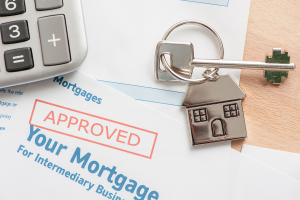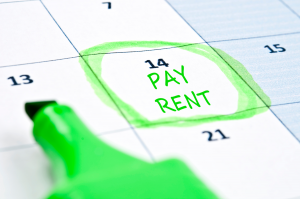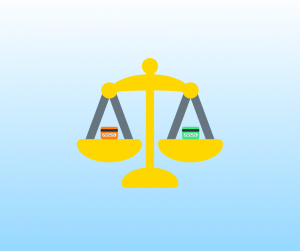How to Build Credit for a Home Purchase

Understanding the Racial Wealth Gap in America
07/20/2022
How Cosigning Impacts Your Credit Score
07/27/2022 Homeownership is a big financial goal. Although there are many important steps on the path to your dream home, building a good credit score might be the most critical.
Homeownership is a big financial goal. Although there are many important steps on the path to your dream home, building a good credit score might be the most critical.
Not only does the right credit score set you up for the possibility of homeownership, but it could also save you thousands on your costs. So, to say that your three-digit credit score matters to your homeownership goals is an understatement.
But just like saving up for a big down payment, building a good credit score is easier said than done. The good news is that a good credit score is within reach. Let’s explore how you can build credit for your home purchase.
Why Credit Matters for Homeownership
When applying for a home loan, your credit score is one of the key details lenders look at. It’s one of many financial factors lenders consider. Other factors include your income, debt burden, and current assets.
Here’s why your credit score matters as a future homeowner.
Lenders Require a Good Credit Score
Most lenders require a credit score of at least 620 for home buyers. However, some government-backed home loans have lower credit score requirements.
For example, the FHA loan backed by the Federal Housing Administration has a minimum credit score requirement of 580. And the VA loan backed through the U.S. Department of Veterans Affairs doesn’t set a particular credit score requirement.
Although you can obtain a home loan with these minimum score requirements, the reality is that most home buyers have a much higher credit score. According to the Federal Reserve Bank of New York, buyers taking out a mortgage in Q2 of 2021 had a median credit score of 786.
As a prospective home buyer, a good credit score is a critical part of your mortgage application. Without it, you might not find a lender willing to work with you.
Save on Interest Payments
Beyond the lender requirements, a good credit score can set you up for a more affordable homeownership journey. If you have an excellent credit score, you can tap into a mortgage with the lowest possible interest rates. If you have a mediocre credit score, you might get approved but face relatively high interest rates. Even the difference of one percentage point can help you fit a mortgage payment into your budget. When the savings are considered over time, you could save thousands.

Let’s consider two examples.
Buyer A has a higher credit score that allows them to tap into a 5.0% interest rate for their 30-year fixed-rate $250,000 mortgage. With that, the buyer has a monthly mortgage payment of $1,342 and pays a total of $233,139 in interest over the life of the loan.
Buyer B is also taking out a 30-year fixed-rate mortgage with a loan amount of $250,000. But a lower credit score means they lock in a 6% interest rate. With that, the buyer has a monthly mortgage payment of $1,499 and pays $289,595 in interest over the life of the loan.
A higher credit score allows the first buyer to save $157 per month on their mortgage payments. Plus, they save $56,456 over the course of the loan.
Ultimately, a higher credit score can help you save money as a homeowner.
How to Build Credit for Home Purchase
It’s clear that a good credit score is a key part of a successful homeownership journey. The good news is that a good credit score is likely within reach!
Whether you are starting from scratch or need to rebuild your credit, there are some strategies to implement. Consider tackling the tips below one at a time.
Get Credit for Your Alternative Payments
Even if you don’t have a traditional credit account, you probably have some regular bills to pay. If you are making those payments on time each and every month, it would be nice to get credit for your responsible money management.
A few types of alternative data that could be added to your credit report include utilities, subscription streaming services, and a cellphone plan. Although you won’t get credit for these payments automatically, you can ask for help.
Experian Boost is one option. It’s a free service that looks at your bank records to determine your payment history for select bills. However, this opportunity will only work if the bills are in your own name. So, if you spilt a cell phone bill with your family, you won’t get credit unless the account is in your name.
You’ll get credit when the credit bureau adds this on-time payment information to your credit report. On average, Experian Boost users see their credit score increase by 13 points.

Get Credit for Rent
Rent is another bill that you pay regularly. If you are making rent payments on time each month, then why not get credit for it?
Just like other alternative credit data, you can have your rent payments added to your credit report. With a long history of on-time payments, your credit score should improve. That’s because your payment history accounts for 35% of your FICO score.
A few services that can help you get credit for paying rent include Rental Kharma, LevelCredit, Rent Reports, and Rock the Score.
Reduce Debt
A high debt burden can drag your credit score down. Beyond that, lenders considering your homeownership application will look at your debt-to-income ratio (DTI).
You can calculate your DTI by adding up all of your required monthly debt payments and dividing it by your gross monthly income.
For example, let’s say that you have a car payment of $500 each month and a credit card payment of $200. That would lead to a total monthly debt payment requirement of $700. If your monthly income is $5,000, then your DTI would be 14%.
Most lenders want to see a DTI below 43%. But paying off your debts can also help you lower your credit utilization ratio, and in turn, improve your credit score.
Not sure how to make paying off debt a reality? Consider the snowball and avalanche strategies.
The snowball method involves paying off debts in order from the smallest balance to the highest balance. With each debt you eliminate from the books, you can add its monthly payment to your debt snowball for the next largest debt. As your snowball grows, you’ll tackle bigger and bigger debts.
The avalanche method involves paying off debts in order from the highest interest rate to the smallest interest rate. Every time you eliminate a debt, you’ll work on the debt with the next highest interest rate. The avalanche method is more mathematically efficient. But you might miss out on celebrating the smaller wins at first.
Make On-time Payments
Your payment history accounts for 35% of your FICO score, which makes it the most important factor. If you have any credit accounts, making on-time payments will positively impact your credit score.
Making on-time payments might be easier said than done. If you have trouble remembering the deadlines for all of your credit accounts, then take advantage of autopay. The assistance from technology will make sure that you never accidentally miss a payment.
However, this won’t help if your cash flow is causing you to miss payments. If you know that you are going to miss a payment because you simply don’t have the cash available, then consider calling your lender. For customers that usually make on-time payments, most lenders are willing to work out a special arrangement. A few options to ask for include a change to the due date or a temporary forbearance.
Lower Credit Utilization Ratio
Your credit utilization metrics are very important to your FICO score. This category overall makes up 30% of your score.
Your credit utilization ratio is based on revolving credit account limits and your usage. For example, let’s say that you have a credit card with a $10,000 credit limit. If you have a balance of $7,000, then your credit utilization ratio would be 70%.
A low credit utilization ratio will have a positive impact on your credit score. It’s best to keep your credit utilization ratio below 10%. A higher credit utilization ratio will drag your score down.
You can lower your credit utilization ratio in two ways: either pay off debt or increase your credit limits. We’ve already explored debt repayment strategies. But how can you increase your credit limits? It’s as easy as asking your credit card issuer. In some cases, they’ll be willing to grant an increase based on an increase in your income or credit score.
Open a Secured Credit Card
A secured credit card is a useful tool for credit building. Essentially, you’ll make a deposit that acts as your credit limit for the card. If you don’t pay your bills on time, the credit card issuer has the right to claim your collateral deposit to cover your spending.
If you are able to make on-time payments, a secured credit card can help you establish credit. But be careful when you start using your secured credit card to make sure your credit utilization ratio isn’t too high.
Most secured credit cards have very low limits, usually in the range of a few hundred dollars. With that, it’s easy to quickly create a high credit utilization ratio. If you open a secured card, make sure to use it sparingly and pay off the balance often to avoid any negative impacts on your credit.
Take Out a Credit-Builder Loan
A credit-builder loan is designed to help you build credit and savings at the same time. If you want to build credit from scratch to buy a home, this might be the perfect opportunity. It allows you to save for a down payment and get credit for your monthly savings.
Here’s how a credit-builder loan works.
You’ll take out a loan with a credit-builder loan provider. Unlike a regular loan, you won’t receive any of the funds upfront. Instead, you’ll start making monthly payments right away. The payment is split into two components—the principal and interest portions. The lender may hang onto the interest portion. But they will send the principal payment amount into a savings account or certificate of deposit with your name on it.
Throughout the loan term, the lender will report your payment history to the credit bureaus. If you are making on-time payments, your credit score should see improvement. At the end of the loan term, you’ll receive the savings you’ve built. Those savings will definitely come in handy for the home-buying process.
Become an Authorized User
If you have a family member or friend with impeccable credit, then becoming an authorized user on their credit card can help you build your credit history. Although it’s a big ask, someone might be willing to help you out.
Keep in mind that the credit account should be in good standing if you are considering becoming associated with the account. If you aren’t sure whether or not becoming an authorized user is a good fit for you, then check out these scenarios when it’s not a good idea.
Check Credit Report
Although you might think of a credit score and a credit report as the same thing, they are two different things. Your credit score is based on the information on your credit report. So, if your credit report has negative information, then you’ll have a lower credit score.
If you are preparing for a home purchase, it’s a good idea to check your credit report. In some cases, you might find a mistake that is dragging your credit score down. It’s possible to have inaccurate information removed. But it starts with a comprehensive look at your credit report.
Consider Credit Repair

If you spot any inaccurate information on your credit report, then it’s time to consider credit repair. A misrecorded payment or fraudulent credit account will not work in your favor.
Essentially, credit repair is the process of removing any inaccurate information that is dragging your credit score down. You can hire a reputable credit repair service to remove the inaccurate information.
But you can also tackle credit repair on your own. It’s as simple as filing a dispute with the credit bureaus. If you can provide enough information to clarify a mistake, then the credit bureau should remove it within 30 days.
The Bottom Line
All good things take time. When it comes to building credit, a good credit score will take time. As you implement these strategies, try to be patient along the way. If possible, start working on building your credit score well before you want to buy a home.





